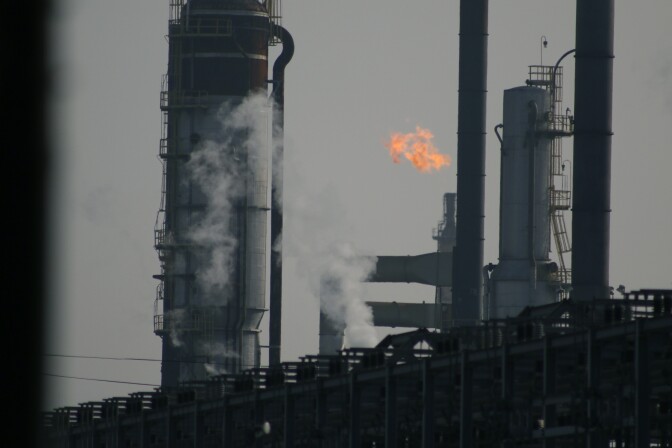This story is free to read because readers choose to support LAist. If you find value in independent local reporting, make a donation to power our newsroom today.
This archival content was originally written for and published on KPCC.org. Keep in mind that links and images may no longer work — and references may be outdated.
New refinery safety laws pass, but ban on deadly chemical stalls

Gov. Jerry Brown signed three new laws this week intended to make local refineries safer for their neighbors. But one big change remains elusive, and that's a ban on refineries using a toxic chemical known as modified hydrofluoric acid.
An explosion at the Torrance refinery in 2015 woke neighbors to the risk that, if released, the chemical could form a deadly cloud capable of floating along the ground for miles, injuring those in its path. A large piece of blast debris landed perilously close to a tank of the chemical.
State assemblyman Al Marutsuchi (D-Torrance) wrote three refinery safety bills approved this session. One requires refineries to pay for better community alert systems in case of accidents or toxic releases. Another adds air quality monitors to provide real-time information on emissions coming from refineries. A third bill strengthens state oversight of refinery worker safety and emergency response.
But his fourth refinery bill, AB-1645, to ban refinery use of modified hydrofluoric acid by 202o is on hold in the Assembly Environmental Safety and Toxic Materials Committee. Muratsuchi says he’s willing to wait to see if the South Coast Air Quality Management District enacts its own ban, which could take effect by 2025.
"We’re not trying to shut down the refinery. We just want to protect the families in the communities that live surrounding the refinery," Muratsuchi said.
Converting California’s last two refineries that use hydrofluoric acid to a different chemical process could cost hundreds of millions of dollars. A state Energy Commission analysis says a ban could mean closure of the Torrance and Valero Wilmington refineries, the loss of hundreds of jobs and higher fuel prices for Southern Californians.
The refineries are fighting the proposed rule change saying the AQMD has failed to establish its case for a phase-out. In letters to the AQMD, they say it’s too expensive to change to another technology. They also say regulators are not paying attention to the refineries’ analyses that conclude modified hydrofluoric acid would not turn into a toxic traveling cloud if it were released in an accident.
Torrance Refinery officials say MHF has been safety used for 20 years and that imposing a ban by 2023 or 2025 as suggested by AQMD is premature. The only known alternative to using hydrofluoric acid is a process that uses sulfuric acid. Refinery officials say it is not only not safer but would increase emissions and costs too much, refinery manager Steve Steach said in the letter.
A Valero executive said that if the AQMD wanted to phase out chemicals that can create toxic clouds, it should go after 64 industrial sites that use anhydrous ammonia and 60 sites that store chlorine.
“It makes no sense for the District to single out two specific users (Torrance and Wilmington Valero refineries) of one toxic chemical who already have adopted extensive and effective mitigation measures while ignoring entirely the the relatively greater impacts associated with users of other chemicals…” wrote Valero Vice President and General Manager Mark Phair.
An analysis by the California State Energy Commission found that replacing the hydrofluoric acid process with another would probably be too expensive for either refinery to undertake.
A ban would likely lead to the refineries closing, said Gordon Schremp, a staffer with the commission. And the closure of both refineries could translate into Southern Californians having to buy more imported fuel at higher prices.








